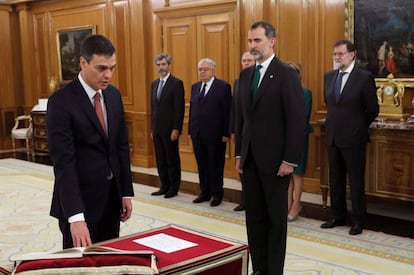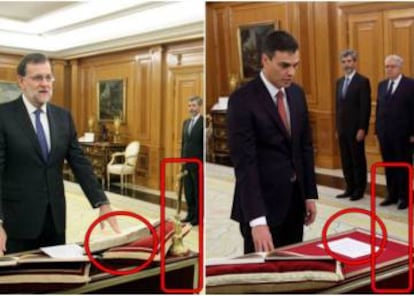New PM’s swearing-in ceremony prompts question: just how secular is Spain?
There was no Bible in sight as Pedro Sánchez promised to uphold the Constitution, prompting a renewed debate about the role of religion in a non-denominational state

On Saturday, Pedro Sánchez became the seventh head of government in modern Spanish democracy to take the oath of office, and the first one to do so with no religious symbols present.
The absence of a Bible and crucifix did not go unnoticed, although some observers wondered why this should be an issue at all, given that Spain is a secular state.
Toma de posesion de @sanchezcastejon sin símbolos religiosos en Zarzuela. Entramos en el siglo XXI
— Pepa Bueno (@PepaBueno) June 2, 2018
Sánchez's swearing-in ceremony with no religious symbols. We are entering the 21st century. SER journalist Pepa Bueno
The role of the Roman Catholic Church in Spain is the subject of periodic debates. Either it’s because of a Catholic Mass that gets aired by the state broadcaster TVE, or because of the income tax return, where taxpayers can check a box allotting a certain amount of money to the Church, or because of the role of religion in schools that are partially funded by the state, or because of the official holidays, which are tied to Catholic celebrations.
The Spanish Constitution does not talk about a complete separation between Church and State. Instead, it says that “no religious faith shall have a state character” and also that “the public authorities shall take into account the religious beliefs of Spanish society and shall consequently maintain appropriate cooperation relations with the Catholic Church and other confessions.”
José Antonio García, author of La libertad religiosa en la negociación colectiva (or Religious freedom in collective bargaining), writes that “there is no doubt that the weight of the Episcopal Conference (body of bishops) on the issue of religious holidays puts the Catholic Church in a position of privilege compared with minority faiths, even though our Constitution declares the state to be non-denominational.”
García says this is explained because of “the historical and sociological weight of the Catholic Church in our country.” According to recent calculations by the Europa Laica association, the Roman Catholic Church receives €11 billion annually from the Spanish state.
The following points can help understand how religious feelings have been changing in Spain:

- There are growing numbers of self-declared atheists and fewer Catholics, according to an EL PAÍS story from June 2016. Among those who see themselves as Catholics, there is an uninterrupted drop in those who say they are practicing Catholics.
- One out of every four Spaniards declared themselves to be either atheist or non-believers in a CIS poll conducted in June 2017. Nearly 70% of respondents said they felt Catholic, yet 60% of this group “almost never” goes to church except for weddings, first communions or funerals. On the other hand, there is a huge drop in church weddings, and very few people are taking religious vows.
- Since 1992, Spain has agreements with the main Evangelical, Jewish and Islamic federations in the country.
- Even as jurists and supporters of secularism keep asking to eliminate three articles from the criminal code that set out fines and prison terms for offending religious feelings, the four main organizations representing Catholics, Muslims, Jews and Evangelicals got together a few months ago to denounce what they see as “constant and reiterated offenses against the feelings” of their own communities. Since 2012 there has been a spike in complaints over alleged offenses against religious sentiment, but these typically never end in convictions.
English version by Susana Urra.
Tu suscripción se está usando en otro dispositivo
¿Quieres añadir otro usuario a tu suscripción?
Si continúas leyendo en este dispositivo, no se podrá leer en el otro.
FlechaTu suscripción se está usando en otro dispositivo y solo puedes acceder a EL PAÍS desde un dispositivo a la vez.
Si quieres compartir tu cuenta, cambia tu suscripción a la modalidad Premium, así podrás añadir otro usuario. Cada uno accederá con su propia cuenta de email, lo que os permitirá personalizar vuestra experiencia en EL PAÍS.
¿Tienes una suscripción de empresa? Accede aquí para contratar más cuentas.
En el caso de no saber quién está usando tu cuenta, te recomendamos cambiar tu contraseña aquí.
Si decides continuar compartiendo tu cuenta, este mensaje se mostrará en tu dispositivo y en el de la otra persona que está usando tu cuenta de forma indefinida, afectando a tu experiencia de lectura. Puedes consultar aquí los términos y condiciones de la suscripción digital.









































